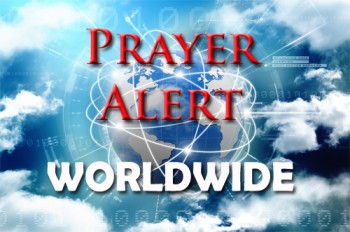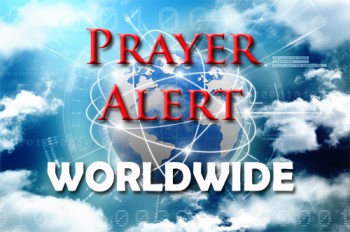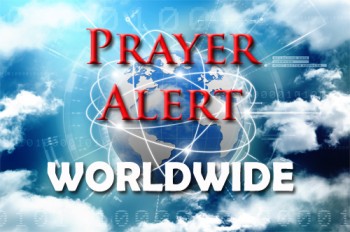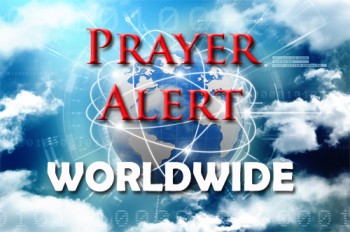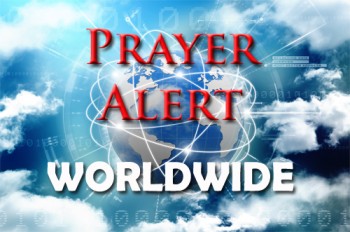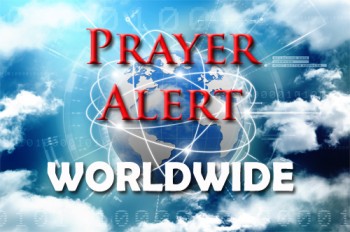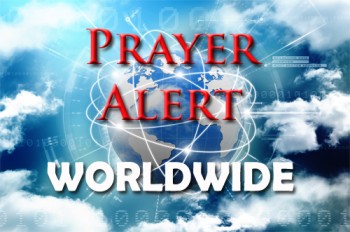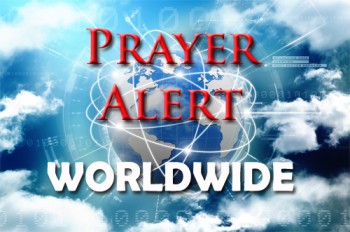Displaying items by tag: Africa
Pray for Nigeria
When Nigerian front-line worker Daniel Zagi was interviewed by Voice of the Martyrs, he used the word ‘pray’ 42 times. ‘If there is anything you want to do for us, pray’, he said. ‘We are here, and we are fighting for the cause of the gospel in the north.’ Many Christians in northern Nigeria have lost loved ones and homes in attacks by Boko Haram and Fulani militants, who seek to drive Christians out and establish an Islamist nation. Many pastors have been forced to flee the region, and entire congregations have been displaced. Nigerian believers need our prayers as they advance the gospel amid these violent attacks. Pray that believers suffering repeated attacks will withstand persecution and persevere in faith. Ask God to comfort all those who have experienced great loss because of this violence.
Naomi’s story
Naomi and other refugees ate edible leaves while fleeing Boko Haram. She was desperate. ‘I had only God, and I talked to Him. He gave me the strength I needed.’ Naomi, her children and several thousand other refugees hid on a mountain for two years before Boko Haram chased them, with guns and bombs, to Cameroon. After leaving Cameroon, she found a camp for internally displaced people, but again they were told to leave. ‘I did not know where to go, so I cried to God.’ Next, Voice of the Martyrs workers found her - an answer to her prayers. They helped her children start school, and helped them move into their own house. ‘Since the passing of my husband, God has kept me. The attack only made me stronger in my faith.’
DRC: Christian persecution
Over a dozen lives are claimed in nightly raids in the Democratic Republic of the Congo. On 1 March Italian diplomats and World Food Programme workers were killed in an attack on a UN convoy. Officials blame the Allied Democratic Forces, or ADF, for this incident - the latest in a disturbing trend. Armed groups have killed over a thousand civilians in eastern DRC since late 2019. ‘In 2021, we’ve seen mass attacks by these Muslim extremists,’ said Voice of the Martyrs Canada. There are more than 100 armed groups operating in DRC. Not all of them are Islamic, but those that are have one goal in mind. They are radical, and even though they may have lost some control in places like Iraq and Syria they’re doing whatever they can to cause destruction, particularly where a large majority of people are Christian.
Egypt: Muslims to help build churches
Egypt will now allow Muslims to build Christian churches as paid labourers. In the past, Muslims have often seen this kind of work as taboo. The pronouncement allows them to help build any of the 44 churches now under construction around Egypt. They can also join the work on 16 historic Coptic churches now being restored. Tom Doyle of Uncharted Ministries says, ‘This is a big step. This is the government saying, “We are giving our okay for this”. And that’s another good sign. So we are thankful for that, and pray that there will be better relations between Muslims and Christians. We know as Muslims become exposed to the Gospel and see the joy of the Lord in believers, it is attractive to them. They want to know more. Saudi Arabia is the heart of Arab Islam. But Egypt is the brains of Arab Islam.’
Nigeria: kidnapping scourge
The 2014 kidnap of 276 Chibok schoolgirls brought global attention to raids on schools in Nigeria. Now criminals are making money with copycat crimes. Nearly 300 girls were kidnapped from a boarding school last week, then released four days later after a ransom was paid. One girl said, ‘Most of us got injured, and we could not carry on walking. They said they would shoot anybody who did not continue walking. We walked across a river and they let us sleep under shrubs in a forest.’ Their release was secured through negotiations between government officials and the abductors. Kidnapping for ransom is a widespread criminal enterprise. Both rich and poor are seized by gunmen on almost a daily basis. Security personnel have also been held. The aim is to secure someone's release by raising funds from friends and relatives - or even selling their assets.
Ghana: life-changing events
Wycliffe Bible Translators are launching New Testaments in three different languages in Ghana over four days, and Christians across the nations can join the dedications live on Facebook. The Tafi, Logba and Nyagbo peoples receive their New Testaments on 25, 27 and 28 February respectively. The events, which start at 10 am each day, are hosted by a local organisation partnered with Wycliffe. You can watch the celebrations at facebook.com/gillbt.org. Also, on 25 February Ghana became the first country to receive a shipment of free Covid vaccine doses. This is a historic step towards an equitable distribution of vaccines to the areas where those most at risk live. It will be the largest vaccine procurement and supply operation in history, which will continue in the coming days and weeks.
DRC, Guinea: Ebola resurgence
The ministry of health declared an Ebola epidemic in the N’Zerekore region of Guinea on 14 February, following seven confirmed cases and three deaths. US government agencies are closely monitoring the epidemic, and coordinating with the Guinea government, the World Health Organisation, and other partners to provide rapid, localised outbreak control. This outbreak follows a declaration of an outbreak on 7 February by the DRC’s minister of health. The previous West African outbreak in 2014-16 killed over 11,300. The source of infection is under investigation. It is important to monitor one’s health for 21 days after travelling to an area experiencing an Ebola outbreak.
Mozambique: IS terrorism
IS has taken a firm grip on territory in Mozambique, far from its original strongholds in Syria. Even though it is losing territory in most other places, it has killed and kidnapped thousands in the country since 2017. Sphiwe, a Christian worker with Trans World Radio, says, ‘They behead people, they attack homes and villages. People live in fear. It causes displacement, as people move away to protect themselves.’ Many fear the next attack so much they avoid working in the fields. Christian broadcasting continues in troubled areas and also provides support for refugees. Sphiwe says, ‘It is emotionally draining. Sometimes they are adopted or taken in with other families, so that one family may end up having fifty people within one home because they are trying to help out.’ Pray for those fleeing from trauma in Mozambique to find hope and life in Jesus.
Kenya: kill the disbelievers, torch churches
On 29 January Al-Qaeda’s Somali affiliate Al-Shabab Al-Mujahideen released a video documenting preparations for a raid on Camp Simba US military base. The 55-minute video features a meeting between Al-Shabab leaders and the attackers; of training and preparations for the raid; final messages from the attackers; and drone footage of the raid in progress. The leader vowed more attacks on US targets and rallied his ‘soldiers of Allah’ saying, ‘I hope that base becomes the place where we hear the defeat of the disbelievers’, and encouraged Muslims in the Horn of Africa to join the ranks of his group. Also five churches were set ablaze in quick succession between 21 and 26 January. Pray for the fearful residents living in the area and the congregations of Seventh Day Adventist, Pentecostal and Catholic churches. See
Nigeria: military kill Christian soldiers
Slaughtering Nigerian Christians continues unabated. An average of ten Christians are killed daily. A recent episode was at the hands of the government, which executed six Christian soldiers in Abuja on false charges. A Muslim colonel stole weapons from an armoury, but six Christian soldiers on duty got blamed for the theft. Their lawyer claimed they died ‘purely because they were Igbo and Christian. The government of today detests Christianity and detests the Igbo tribe.’ He had petitioned the government to provide a defence, but his attempt was denied and they were executed in secret. Nigeria’s constitution gives the military no authority to execute people, and prisoners should be able to appeal to a higher court. They didn’t get their rights. The military now claims that they were never executed, but they have not been seen by their families or in public.
